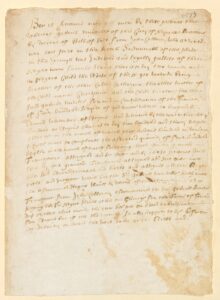
Sale of Catharina, Chrispina, and the child Marta, date unknown, Ulster County Archives
Gabriel Minvielle, Mayor 1684-1685: Minvielle (?-1698) was a merchant in the fur and Caribbean trades.[1]
In his will, dated March 8, 1698, Minvielle leaves to his wife, Susannah, “all my negro and white servants.” An enslaved woman named Isabella and “children of my Spanish Indian woman called Koffey” were to be freed after the death of his wife.[2]
On November 7, 1673, Minvielle demanded payment after failing to receive “a negro boy” in exchange for money and 855 pounds of Muscovado sugar. From court minutes:
Minviele by his atty Joh : Coderrie , arrestant and pltf . vs Wm Schackerly , deft . Pitf . demands from the deft . a negro boy according to agreement with fl . 69. 10 . and 855 lbs . of Muscovado sugar according to obligation . Deft . admits the debt , but has no opportunity to ship it hither in consequence of this change of government . The W. Court having heard the arguments on both sides and having examined the obligation and contract , decree and order , that in case no ship were permitted to come hither from Barbadoes within 12 months , the sale of the negro shall be annulled povided the deft . shall pay the pitf . the debt to the sum of fl . 717 , 10 zewant and 835 lbs . Muscovado deducting the freight and other expences , according to obligation ; also that the deft . shall enter sufficient security therefor and pay the costs herein incurred.[3]
A November 13, 1676, a mortgage states that Minvielle sold an enslaved man named Prince for three hundred schepels (1 schepel = 0.764 bushel of wheat) of wheat:
Appeared before me Wm LaMontagne, Secretary for the hon. court at Kingston, Wallrand Dumon who acknowledges to honestly and actually owe Mr Gabriel Minniville a quantity of three hundred sch. of good winter wheat to be paid in three payments or installments, all to be delivered free at the bank. Precisely hundred sch. of which are to be paid in March of the next year 1677, in [the month of] March following again hundred and fifty sch. of wheat , and in March of the year 1679 the remaining fifty sch. of wheat. All of which amount originates from the purchase of a negro named Prince. For the purpose of complying with the present the negro shall be mortgaged until the full and effective payment, and further person and effects, none excepted. Have subscribed to the present besides the below-named witnesses, this November 13, 1676 at Kingston. …[4]
On February 2, 1680, Gabriel Minvielle brought a case against “his Negro called Danielle for drawing his knife” against a “Burger of this Citty and rideing in a Cart contrary to the orders of this Citty, and several other Misdemeanors…” It was ordered that “the said Negro” have “forty Lashes at the Whipping post” and the plaintiff to pay costs. Francis Rombouts was mayor at this time.[5]
An April 12, 1680, mortgage states that Minvielle owned an enslaved child:
Be it Known by the present that before us the court at Kingston there has appeared Elisabet Hals widow of the deceased Mr Gorge Hall who admits to honestly and actually owe Mr Thoomas dLavall, to him, his order or heirs the amount of eight thousand seven hundred sixty eight gldrs received to her satisfaction by her deceased husband. Said Mrs Hals further admits to owe Mr Gabriel Minniville, merchant at N. Yorcke the amount of three thousand sixty gldrs and thirteen st. representing a quantity of five hundred and ten sch. of wheat three hundred sch. of which wheat she is to deliver free an N. Yorck the balance free on the river bank (strandt). Which debts to both creditors she will have to pay in one year after the date of the present in good merchantable wheat. Mrs Hals is yet to Keep the negro child, belonging to Mr Gabriel Miniville, for one year, and then to deliver the same to Mr Gabriel Minville at her own expense.[6]
On November 17, 1682, court finding reveals Minvielle exchanged an ox for an enslaved persons: “The hon. court finds, through a declaration, that the ox does not belong to Parrot, but that it is Minville’s ox, the same having been exchanged for a negro. (alsoo’t by ruylinge van een Neger).”[7]
Date unknown, Gabriel Minvielle sold two women and an enslaved child for 400 schepels of wheat. Their names were Catharina, Chrispina, and the child Marta.
Bee it Known unto all men by these presents that whereas Gabriel Mienelle of this city of Nyorck, merchant, by virtue of Bill of sale from John Calloway who arrived into this port in the Ketch Susannahh of this place in the springh was Invested and legally possest of three Negero female slaves that is to say two women and a Negero Child the Eldest of the negro women being mother of the other called Catharina the other mother of the child named Chrispina and the child Marta. Hee the said Gabriel Minelle for and in consideration of the quantity of four hundred scheple of god winter wheate to bee paid by Edward Whittakar of Esoopus…[8]
[1] Merchants & Empire, p.76, 222
[2] Abstracts of Wills on File in the Surrogate’s Office, 1665-1801, Vol.1, p.339-340, found at FamilySearch, link
[3] Minutes of the Court of Burgomasters and Schepens of New Amsterdam, July 12, 1663 – May 1664, “New York City, New York, United States records,” FamilySearch, link, viewer image 17 of 196
[4] Ulster County Archives, Dutch court records of Wiltwyck 1661-1709, mortgage
[5] Select cases of the Mayor’s court of New York City, 1674-1784, p.742; FamilySearch
[6] Ulster County Archives, Dutch court records of Wiltwyck 1661-1709, mortgage
[7] Ulster County Archives, Dutch court records of Wiltwyck 1661-1709, court case
[8] Ulster County Archives, Dutch court records of Wiltwyck 1661-1709, sale record
Copyright 2025 Paul Hortenstine



